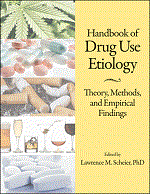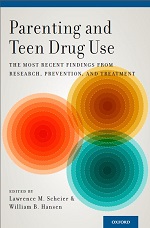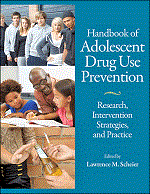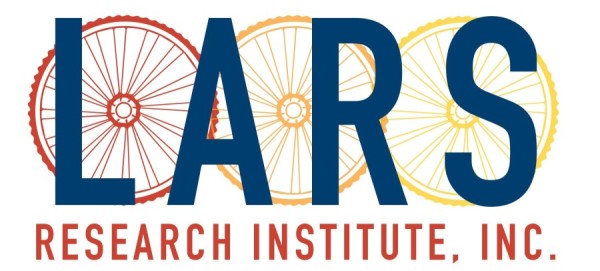Publications
Salzbrenner, Scheier, & Qiu (2025). Prior Authorization of Medication and Its Influence on Provider Behavior: Latent Class Analysis. [Download]
Scheier, Hansen, Javornik, & Stone (2025). Latent Class Analysis of Gameplay Metrics from Youth Playing a Robotics Game. [Download]
Shigeto & Scheier (2025). Promoting sexual well-being of college students through wellness programs. [Download]
Pierantoni, Stera, Biagi, Dondi, Scheier, & Lanari (2025). High Flow Nasal Cannula and Non Invasive Ventilation for Acute Bronchiolitis in the Paediatric Wards. [Download]
Harbichova et al. (2025). SMS LPA. Latent Profiles of Sport Motivation in Czech University Students: An Exploratory Person-Centered Approach Using the Sport Motivation Scale. [Download]
Shigeto & Scheier (2024). Promoting sexual well-being of college students through wellness programs. [Download]
Shigeto & Scheier (2024). Learning About Sex from Different Sources: Implications for Sexual Attitudes, Sexual Knowledge, and Risky Sexual Behavior Among U.S. College Students. [Download]
Scheier (2024). Commentary: The Need for Theories of Change in Training and Technical Assistance: Where the Rubber Meets the Road. [Download]
Scheier & Wandersman (2024). Collective Impact—Strengthening the Science and Practice of Implementation Support: Evaluating the Effectiveness of Training and Technical Assistance Centers. [Download]
Wandersman & Scheier (2024). Strengthening the Science and Practice of Implementation Support: Evaluating the Effectiveness of Training and Technical Assistance Centers. [Download]
Pierantoni, Andreozzi, Stera, Vespasiani, Biagi, Zama, Balduini, Scheier, & Lanari (2024). National survey conducted among Italian pediatricians examining the therapeutic management of croup. [Download]
Komarc, Shigeto, & Scheier (2024). Item response theory and computer adaptive testing of the sexual knowledge scale of the sexual knowledge and attitude test in a college sample. [Download]
Hansen, Clayton, & Scheier (2024). D.A.R.E. Drug Prevention during the Pandemic: Response to COVID-19. [Download]
Masini, Longo, Ricci, Scheier, Sansavini, Ceciliani, & Dallolio (2024). Investigating Facilitators and Barriers for Active Breaks among Secondary School Students: Formative Evaluation of Teachers and Students. [Download]
Shigeto & Scheier (2023). The Current Status of Sex Education in U.S. Colleges and Universities: A School Website Content Review. [Download]
Sanmarchi, Scheier, Dallolio, Ricci, Longo, Ceciliani, & Masini (2023). Association of Socioeconomic Factors and Physical Activity with Health-Related Quality of Life in Italian Middle School Children: An Exploratory Cross-Sectional Study. [Download]
Sanmarchi, Masini, Poli, Kawalec, Esposito, Scrimaglia, Scheier, Dallolio, & Sacchetti (2023). Cross-Sectional Analysis of Family Factors Associated with Lifestyle Habits in a Sample of Italian Primary School Children: The I-MOVE Project. [Download]
Marini, Messina, Masin, Scognamiglio, Caravita, Leccese, Soldà, Parma, Bertini, Scheier, & Dallolio (2023). Application of the COM–B Framework to Understand Facilitators and Barriers for Practising Physical Activity among Pregnant Women and Midwives Participating in the WELL-DONE! Study. [Download]
Griffin, Botvin, Scheier, & Williams (2023). Long-term behavioral effects of a schoolbased prevention program on illicit drug use among young adults. [Download]
Masini, Sanmarchi, Kawalec, Esposito, Scrimaglia, Tessari, Scheier, Sacchetti, & Dallolio (2022). Mediterranean diet, physical activity, and family characteristics associated with cognitive performance in Italian primary school children: analysis of the I‑MOVE project. [Download]
Sanmarchi, Gibertoni, Golinelli, Gori, Fantini, & Scheier (2022). Trust in science, medicine and medical providers and its relations to vaccine beliefs: A latent class analysis. [Download]
Salzbrenner, McAdam-Marx, Lydiatt, Helding, Scheier, & Hill (2022). Perceptions of prior authorization by use of electronic prior authorization software: A survey of providers in the United States. [Download]
Scheier & Shigeto (2022). Developmental cascades in studies of adolescent and young adult substance use etiology: A systematic review. [Download]
Landy, Shigeto, Laxman & Scheier (2022). Typologies of stress appraisal and problem‑focused coping: associations with compliance with public health recommendations during the COVID‑19 pandemic. [Download]
Scheier & Komarc (2022). Associations Between Student Engagement and Drug Use: Age and Gender Comparisons Using the California Healthy Kids Survey. [Download]
Maietti et al. BMC (2021). Assessing the Role of Trust in Information Sources, Adoption of Preventive Practices, Volunteering and Degree of Training on Biological Risk Prevention, on Perceived Risk of Infection and Usage of Personal Protective Equipment Among Italian Medical Students During the SARS-CoV-2 Pandemic. [Download]
Griffin et al. (2021). Adolescent Transitions in Self-Management Strategies and Young Adult Alcohol Use. [Download]
Flaherty & Scheier (2021). Modeling Behavior as Dynamic Sequential States: Introduction to the Special Issue. [Download]
Shigeto et al (2021). Typologies of coping in young adults in the context of the COVID-19 pandemic. [Download]
Scheier & Komarc (2020). Are E-cigarette Users a Unique Group of Smokers? Latent Class Analysis of the National Youth Tobacco Survey. [Download]
Scheier & Griffin (2020). Youth marijuana use: a review of causes and consequences. [Download]
Komarc, Harbichova, & Scheier (2020). Psychometric validation of Czech version of the Sport Motivation Scale. [Download]
Shrestha et al. JAHA (2019). Comparison of Cardiovascular Health Between US Army and Civilians. [Download]
Harbichova, Komarc, & Scheier (2019). Metodické studie. Intrinsic Motivation In Sport Measured By The Sport Motivation Scale In Czech University Students [Download]
Scheier et al (2019). Formative Evaluation to Build an Online Parenting Skills and Youth Drug Prevention Program: Mixed Methods Study. [Download]
Scheier (2019). Journal of Neurotrauma Letter to the Editor. The Spurious Chicken and the Confounding Egg: Commentary on Cumulative Head Impact. [Download]
Motedayen et al. (2019). Psychometric validation of the Sexual Knowledge and Attitudes Test –Adolescents (SKAT-A) in an Iranian sample. [Download]
Seligman et al. (2019). PTSD: Catastrophizing in Combat as Risk and Protection. [Download]
Hansen, Fleming, & Scheier (2019). Self-Reported Engagement in a Drug Prevention Program: Individual and Classroom Effects on Proximal and Behavioral Outcomes. [Download]
Sadiq et al. (2018). Frailty Phenotypes and Relations With Surgical Outcomes: A Latent Class Analysis. [Download]
Mason et al. (2018). Challenges Facing Evidence-Based Prevention: In corporating an Abductive Theory of Method. [Download]
Kumpfer, Scheier & Brown (2018). Strategies to Avoid Replication Failure With Evidence-Based Prevention Interventions: Case Examples From the Strengthening Families Program. [Download]
Shrestha et al. (2018). Protective Effects of Psychological Strengths Against Psychiatric Disorders Among Soldiers. [Download]
Scheier, L. M. (2018). Why Research Design and Methods Is So Crucial to Understanding Drug Use/Abuse: Introduction to the Special Issue, Evaluation & the Health Professions. [Download]
Meca, A., Reinke, L. G., & Scheier, L. M. (2017). Acculturation and Tobacco/Illicit Drug Use in Hispanic Youth, Oxford University Press. [Download]
Vie, L. L., Scheier, L. M., Lester, P. B., & Seligman, M. E. P. (2016). Initial Validation of the U.S. Army Global Assessment Tool. Military Psychology 2016, Vol. 28, No. 6, 468–487. [Download]
Both Gragg, J. Goodyear, R., Scheier, L. M., & Krafft, L. (2016). Using multivariate concept mapping to examine counselor educators’ implicit model of the profession’s functions. The Practitioner Scholar: The Journal of Counseling and Professional Psychology, 5, 141-155. [Download]
Vie, L. L., Scheier, L. M., Lester, P. B., Ho, T. E., Labarthe, D. R., & Seligman, M. E. P. (2015). The U.S. Army Person-Event Data Environment (PDE): A military-civilian big data enterprise. Big Data, 3, 1-9, DOI: 10.1089/big.2014.0055 [Download]
Vie, L. L., Griffith, K. N., Scheier, L. M., Lester, P. B., & Seligman, M. E. P. (2013). The Person-Event Data Environment (PDE): Leveraging big data for studies of psychological strengths in soldiers. Frontiers in Psychology: Technology Report, 4, 1-7. [Download]
Kosten, P. A., Scheier, L. M., & Grenard, J. L. (2013). Latent class analysis of peer conformity: Who is yielding to pressure and why? Youth & Society, 45, 565-590. [Download]
Scheier, L. M. (2012). Primary prevention models: The essence of drug abuse prevention in schools. In H. J. Schaffer, D. A. LaPlante, & S. E. Nelson (Eds.), The American Psychological Association addiction syndrome handbook Vol. 2, Recovery, prevention and other issues (pp. 197-223). Washington, DC: American Psychological Association. [Download]
Griffin, K. W., Scheier, L. M., Acevedo, B., Grenard, J. L., & Botvin, G. J. (2012). Long-term effects of self-control on alcohol use and sexual behavior among urban minority young women. In S. Y. Sussman (Ed.), Substance and behavioral addictions: Co-occurrence and specificity (pp 53-75). Multidisciplinary Digital Publishing Institute: Basel, Switzerland. [Download]
Scheier, L. M., Grenard, J. L., & Holtz, K. D. (2011). An empirical assessment of the Above the Influence advertising campaign. Journal of Drug Education, 41, 431-461. [Download]
Hasking, P. A., Scheier, L. M., & Abdallah, A. B. (2010). The three latent classes of adolescent delinquency and the risk factors for membership in each class. Aggressive Behavior, 37, 19-35. [Download]
Fullard, W., & Scheier, L. M. (2010). The Sexual Knowledge and Attitude Test – Adolescents: Psychometric properties using confirmatory factor analysis methods. In T. D. Fisher, C. M. Davis, W. L. Yarber, & S. L. Davis (Ed.), Handbook of sexuality-related measures, 3rd Ed. Taylor and Francis. [Download]
Scheier, L. M., & Grenard, J. L. (2010). Influence of a nation-wide social marketing campaign on adolescent drug use. Journal of Health Communication, 15(3), 240-271. [Download]
Scheier, L. M. (2010). Methods for approximating random assignment: Regression discontinuity and propensity scores. In E. Baker P. P. Peterson, & B. McGaw (Eds.), International Encyclopedia of Education (3rd ed.) (pp. 104-110). London, UK: Elsevier Ltd. [Download]
Griffin, K. W., Scheier, L. M., & Botvin, G. J. (2009). Developmental trajectories of self-management skills and adolescent substance use. Health and Addictions [Salud y Drogas], 9, 15-37. [Download]
Scheier, L. M., Lapham, S. C., & C’de Baca, J. (2008). Cognitive predictors of alcohol involvement and alcohol-related consequences in a sample of drunk-driving offenders. Substance Use & Misuse, 43(14), 2089-2115. [Download]
Scheier, L. M., Abdallah, A-B., Inciardi, J. A., Copeland, J., & Cottler, L. B. (2008). Tri-city study of ecstasy use problems: A latent class analysis. Drug and Alcohol Dependence, 98, 249-263. [Download]
Abdallah, A. B., Scheier, L. M., Inciardi, J. A., Copeland, J., & Cottler, L. B. (2007). A psycho-economic model of ecstasy consumption and related consequences: A multi-site study with community samples. Substance Use and Misuse, 42, 1651-1684. [Download]
Griffin, K. W., Botvin, G. J., & Scheier, L. M. (2006). Racial/ethnic differences in the protective effects of self-management skills on adolescent substance use. Substance Abuse, 27, 47-52 [Download]
Griffin, K. W., Botvin, G. J., Nichols, T. R., & Scheier, L. M. (2004). Low perceived chances for success in life and binge drinking among inner-city minority youth. Journal of Adolescent Health, 34, 501-507. [Download]
Griffin, K. W., Botvin, G. J., Scheier, L. M., Doyle, M. M., & Williams, C. (2003). Common predictors of cigarette smoking, alcohol use, aggression, and delinquency among inner-city minority youth. Addictive Behaviors, 28, 1141-1148. [Download]
Botvin, G. J., Scheier, M., & Griffin, K. W. (2002). Preventing the onset and developmental progression of adolescent drug use: Implications for the gateway hypothesis. In D. B. Kandel (Ed.), Stages and pathways of involvement in drug use: Implications for the Gateway Hypothesis (pp. 115-138). Oxford, UK: Cambridge University Press. [Download]
Scheier, L. M., Griffin, K. W., Doyle, M. M., & Botvin, G. J. (2002). Estimates of intragroup dependence for drug use and skill measures encountered in school-based drug abuse prevention trials: An empirical study of three independent samples. Health Education and Behavior, 29, 83-101. [Download]
Griffin, K. W., Botvin, G. J., Scheier, L. M., & Nichols, T. R. (2002). Factors associated with regular marijuana use among high school students: A long-term follow-up study. Substance Use and Misuse, 37, 225-238. [Download]
Griffin, K. W., Botvin, G. J., Scheier, L. M., Epstein, J. A., & Diaz, T. (2002). Personal competence skills, distress, and well-being as determinants of substance use in a predominantly minority urban adolescent sample. Prevention Science, 3, 23-33. [Download]
Scheier, L. M. (2001). Etiologic studies of adolescent drug use: A compendium of data resources and their implications for prevention. The Journal of Primary Prevention, 22, 125-168. [Download]
Scheier, L. M., Botvin, G. J., & Griffin, K. W. (2001). Preventive intervention effects on developmental progression in drug use: Structural equation modeling analyses using longitudinal data. Prevention Science, 2, 91-112. [Download]
Scheier, L. M., Miller, N. L., Ifill-Williams, M., & Botvin, G. J. (2001). Perceived neighborhood risk as a predictor of drug use among ethnic minority adolescents: Moderating influences of psychosocial functioning. Journal of Child and Adolescent Substance Abuse, 11, 67-105. [Download]
Griffin, K. W., Scheier, L. M., Botvin, G. J., & Diaz, T. (2001). Protective role of personal competence skills in adolescent substance use: Psychological well-being as a mediating factor. Psychology of Addictive Behaviors, 15, 194-203. [Download]
Scheier, L. M., Botvin, G. J., Griffin, K. W., & Diaz, T. (2000). Dynamic growth models of self-esteem and adolescent alcohol use. Journal of Early Adolescence, 20, 178-209. [Download]
Mitchell, W. G., Scheier, L. M., & Baker, S. A. (2001). Adherence to treatment in children with epilepsy: Who follows “doctor’s orders?” Epilepsia, 41(12), 1616-1625. [Download]
Griffin, K. W., Botvin, G. J., Scheier, L. M., Diaz, T., & Miller, N. (2000). Parenting practices as predictors of substance use, delinquency, and aggression among urban minority youth: Moderating effects of family structure and gender. Psychology of Addictive Behaviors, 14, 174-184. [Download]
Griffin, K. W., Scheier, L. M., Botvin, G. J., & Diaz, T. (2000). Ethnic and gender differences in psychosocial risk, protection, and adolescent alcohol use. Prevention Science, 1, 199-212. [Download]
Botvin, G. J., Griffin, K. W., Diaz, T., Scheier, L. M., Williams, C., & Epstein, J. A. (2000). Preventing illicit drug use in adolescents: Long-term follow-up data from a randomized control trial of a school population. Addictive Behaviors, 25, 769-774. [Download]
Scheier, L. M., & Botvin, G. J., Miller, N. L. (1999). Life events, neighborhood stress, psychosocial functioning and alcohol use among urban minority youth. Journal of Child and Adolescent Substance Use, 9, 19-50. [Download]
Scheier, L. M., & Botvin, G. J. (1999). Social skills, competence, and drug refusal efficacy as predictors of adolescent alcohol use. Journal of Drug Education, 29, 253-280. [Download]
Griffin, K. W., Scheier, L. M., Gotvin, G. J., Diaz, T., & Miller, N. (1999). Interpersonal aggression in urban minority youth: Individual skills and characteristics as mediators of neighborhood, peer, and parental influences. Journal of Community Psychology, 27, 77-114. [Download]
Scheier, L. M., & Botvin, G. J. (1997). Expectancies as mediators of the effects of social influences and alcohol knowledge on adolescent alcohol use: A prospective analysis. Psychology of Addictive Behaviors, 11, 48-64. [Download]
Scheier, L. M., & Botvin, G. J. (1998). Relations of social skills, personal competence, and adolescent alcohol use: A developmental exploratory study. Journal of Early Adolescence, 18, 77-114. [Download]
Botvin, G. J., Malgady, R. G., Griffin, K. W., Scheier, L. M., & Epstein, J. A. (1998). Alcohol and marijuana use among rural youth: Interaction of social and intrapersonal influences. Addictive Behaviors, 23, 1-9. [Download]
Scheier, L. M., Botvin, G. J. & Baker, E. (1997). Risk and protective factors as predictors of adolescent alcohol involvement and transitions in alcohol use: A prospective analysis. Journal of Studies on Alcohol, 58, 652-667. [Download]
Scheier, L. M., Botvin, G. J., Diaz, T., & Ifill-Williams, M. (1997). Ethnic identity as a moderator of psychosocial risk and adolescent alcohol and marijuana use: Concurrent and longitudinal analyses. Journal of Child and Adolescent Substance Abuse, 6, 21-47. [Download]
Scheier, L. M., & Botvin, G. J. (1997). Psychosocial correlates of affective distress: Latent variable models of male and female adolescents in a community sample. Journal of Youth and Adolescence, 26, 89-115. [Download]
Botvin, G. J., & Scheier, L. M. (1997). Preventing drug abuse and violence. In D. K. Wilson, J. R. Rodrigue, & W. C. Taylor (Eds.), Health-promoting and health-compromising behaviors among minority youth (pp. 55-89). Washington, DC: APA Books. [Download]
Scheier, L. M., & Botvin, G. J. (1996). Purpose in life, cognitive, efficacy, and general deviance as determinants of drug abuse in urban black youth. Journal of Child and Adolescent Substance Abuse, 5, 1-26. [Download]
Scheier, L. M., & Botvin, G. J. (1996). Cognitive effects of marijuana [Letter to the editor]. Journal of the American Medical Association, 275, 1547. [Download]
Chen, K., Scheier, L. M., & Kandel, D. B. (1996). Effects of chronic cocaine use on physical health: A prospective study in a general population sample. Drug and Alcohol Dependence, 43, 23-37. [Download]
Scheier, L. M., Casten, R.J., & Fullard, W. (1995). Latent-variable confirmatory factor analysis of the Adolescent Temperament Questionnaire. Journal of Adolescent Research, 10, 246-277. [Download]
Scheier, L. M., & Botvin, G. J. (1995). Effects of early adolescent drug use on cognitive efficacy in early-late adolescence: A developmental structural model. Journal of Substance Abuse, 7, 379-404. [Download]
Scheier, L. M., Newcomb, J. D., & Skager, R. (1994). Risk, protection, and vulnerability to adolescent drug use: Latent-variable models of three age groups. Journal of Drug Education, 24(1), 49-82. [Download]
Mitchell, W. G., Scheier, L. M., & Baker, S. A. (1994). Psychosocial, behavioral, and medical outcomes in children with epilepsy. A developmental risk factor model using longitudinal data. Pediatrics, 94, 471-477. [Download]
Scheier, L. M., & Newcomb, M. D. (1993). Multiple dimensions of affective and cognitive disturbance: Latent-variable models in a community sample. Psychological Assessment, 5, 230-234. [Download]
Newcomb, M. D., Scheier, L. M., & Bentler, P. M. (1997). Effects of adolescent drug use on adult mental health: A prospective study of a community sample. In G. A. Marlatt & G. R. VandenBos (Eds.), Addictive behaviors: Readings on etiology, prevention, and treatment (pp. 169-211). Washington, DC: American Psychological Association. [Download]
Mitchell, W. G., Scheier, L. M., & Baker, S. A. (1993). Effects of psychosocial, acculturative and medical risk factors on academic achievement and social competence in children and adolescents with epilepsy. Annals of Neurology, 34, 458-459. [Download]
Scheier, L. M., & Newcomb, M. D. (1991b). Psychosocial predictors of drug use initiation and escalation: An expansion of the multiple risk factors hypothesis using longitudinal data. Contemporary Drug Problems, 18, 31-73. [Download]
Scheier, L. M., & Newcomb, M. D. (1991a). Differentiation of early adolescent predictors of drug use versus abuse: A developmental risk factor model. Journal of Substance Abuse, 3, 277-299. [Download]
Books
 The Complete Writing Guide To NIH Behavioral Science Grants
The Complete Writing Guide To NIH Behavioral Science Grants
[Download Flyer]
 Handbook of Drug Use Etiology: Theory, Methods, and Empirical Findings
Handbook of Drug Use Etiology: Theory, Methods, and Empirical Findings
[Download Flyer]
 Parenting And Teen Drug Use
Parenting And Teen Drug Use
[Download Flyer]
 Handbook of Adolescent Drug Use Prevention
Handbook of Adolescent Drug Use Prevention
[Download Flyer]
 The Complete Writing Guide To NIH Behavioral Science Grants
The Complete Writing Guide To NIH Behavioral Science Grants  Handbook of Drug Use Etiology: Theory, Methods, and Empirical Findings
Handbook of Drug Use Etiology: Theory, Methods, and Empirical Findings 

